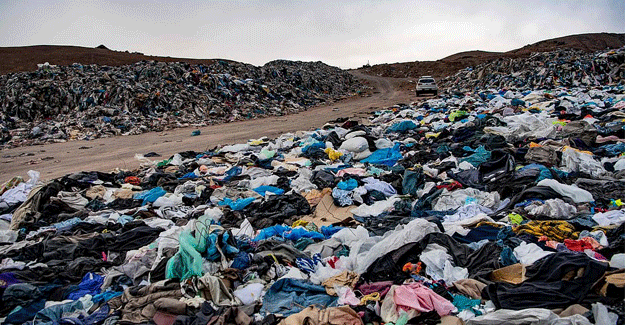Chile Is Learning To Tackle Its Growing Mountain Of Discarded Clothes
- Some 39,000 tons of discarded clothes end up in the mountainous Atacama desert in Chile each year
- So much clothing arrives in Chile that traders cannot hope to sell it and no one is willing to pay the tariffs required to have it transported elsewhere
- Clothing can take 200 years to biodegrade and is as toxic as discarded plastics
- But the waste mountain has encouraged some to start companies aimed at recycling the fabrics for more sustainable ends.
The South American nation of Chile is known worldwide for its incredible mountain ranges, with a whopping 22 mountains peaking at over 20,000 ft. But there is one mountain located in the Atacama desert which is different from the rest. The driest desert in the world is home to a mountain of discarded clothing, containing everything from Christmas sweaters to ski boots, as the pollution from the industry of fast fashion continues to grow.
The social impact of rampant consumerism in the clothing industry - such as the children forced to work in sweatshops or workers slaving away for paltry wages - is well-known, but the disastrous effect on the environment is less publicised. Chile has long been a hub of second-hand and unsold clothing, made in China or Bangladesh and passing through Europe, Asia or the United States before arriving in Chile, where it is resold around Latin America.
Some 59,000 tons of clothing arrive each year at the Iquique port in the Alto Hospicio free zone in northern Chile, where it is bought by clothing merchants or smuggled across the border to other Latin American nations. But at least 39,000 tons that cannot be sold end up in rubbish dumps in the desert. Alex Carreno, a former port employee who worked at the imports zone, said: 'This clothing arrives from all over the world. What is not sold to Santiago nor sent to other countries stays in the free zone'.
According to a 2019 UN report, global clothing production doubled between 2000 and 2014, and the industry is 'responsible for 20% of total water waste on a global level.' The same report said that clothing and footwear manufacturing contributes eight percent of global greenhouse gases, and that 'every second, an amount of textiles equivalent to a garbage truck is buried or burnt.'
Whether the clothing piles are left out in the open or buried underground, they pollute the environment, releasing pollutants into the air or underground water channels. Clothing, either synthetic or treated with chemicals, can take 200 years to biodegrade and is as toxic as discarded tires or plastics. The fast fashion clothing mountain has however encouraged some to develop companies focused on recycling the fabrics for more sustainable ends. Rosario Hevia opened a store to recycle children's clothes, before founding Ecocitex in 2019 - a company that creates yarn from pieces of discarded textiles and clothing in a poor state. Ecocitex uses neither water nor chemicals in the yarn-making process, and works with more than 250 women-led businesses across Chile to sell the recycled products it creates from discarded clothes.
Another company trying to tackle the waste mountain is EcoFibra, which makes thermal insulation panels using fabrics derived from the clothing. Founder of EcoFibra Franklin Zepeda said: “The problem is that the clothing is not biodegradable and has chemical products, so it is not accepted in the municipal landfills. The solution is simply not to bring garbage. But not bringing garbage implies paying more.” Franklin said that the insulation panels his company is able to create are completely fireproof with better noise insulation and thermal conductivity than the widely used fiberglass, while also being considerably cheaper. He said that EcoFibra has managed to recycle and sell plenty of insulation panels, but the demand is yet to really catch on.
Textile Excellence
Next News
uk streets ahead of major economies












